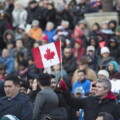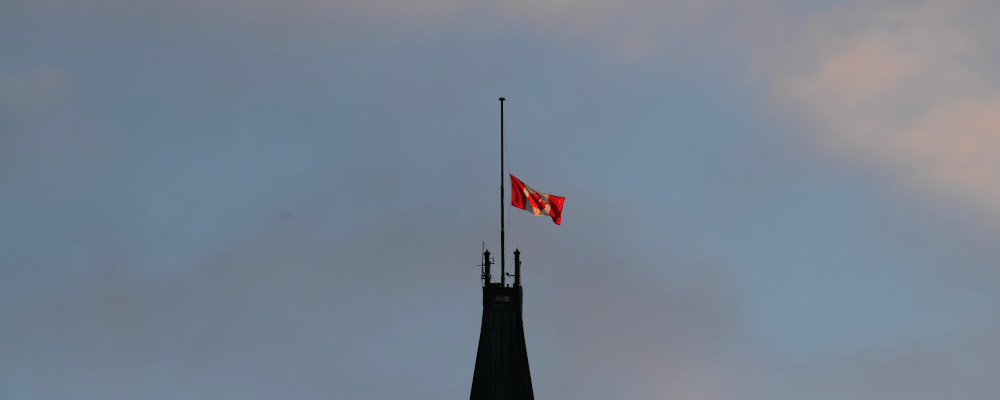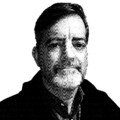The Hub is pleased to present a weekly column from author and historian Antony Anderson on the week that was in Canadian history.
April 1957: the Herbert Norman case dominates the news in Canada
The witch-hunters were ravenous for signs of the Beast. They would pounce on the slightest whiff of contagion. In their frenzy, suspicion was evidence. So, if you were, for example, a respected scholar of Japanese history at a time when the democracies were at war with Japan, if you spoke Japanese, or worse if you had actually been born in Japan, you were tainted. The trouble is that there were beastly people out there, in here, spying for the Russians, believing in the wonders of totalitarian rule, doing everything they could to infect the democracies. How was one to separate the saints from the sinners?
During the Second World War, Herbert Norman was asked by a Japanese friend from their student days at Harvard to retrieve a valuable collection of Japanese books left behind after the friend had been deported. Japan was now the enemy. Norman, who had completed his doctoral thesis on Japanese history, was working in intelligence at External Affairs and wanted those books. He traveled to Massachusetts to the friend’s apartment and found FBI agents going through the empty residence. In the wake of Pearl Harbor, Norman’s interest in these foreign books smacked of heresy. Faced with questions, he was flustered, said he was on official government business (not true), and made such a dodgy impression that the FBI opened a file on him. But with nothing to go on, it languished.

In September 1945, just weeks after Hiroshima and Nagasaki had been turned to ash and seared flesh, Norman was seconded to counter-intelligence in the Allied administration overseeing the occupation of Japan. The request had come from the U.S. State Department. There were so few advisors with his experience. Born to Methodist missionaries in the village of Karuizawa, staying in Japan into his teens, Norman was fluent. He had produced serious scholarly works (still read to this day). External Affairs had posted him to the Tokyo Legation in 1940. When Japan went to war against the Allies, he and his fellow Canadian diplomats were interned under house arrest until they were released in a prisoner exchange. Such was Norman’s nuanced, generous frame of mind that he continued to admire the land of his birth while anti-Asian racism flowed far and wide.
In the postwar reconstruction, Supreme Commander General Douglas MacArthur relied on Norman’s empathetic understanding and network of contacts in Japan’s intelligentsia. The scholar encouraged the general’s benevolent autocracy in such enlightened decisions as releasing communist political prisoners and allowing the Communist Party to run in elections. That’s democracy.
At the same time, Norman’s cultural sensitivity looked more like sin to the rabid anti-communist head of MacArthur’s intelligence unit, one General Willoughby—a fan of Spanish fascist dictator General Franco—who began sending reports to the FBI condemning Norman as a commie sympathizer who had got his fellow travelers freed from Japanese prisons. These toxic efforts reawakened the FBI’s interest. Norman completed his mission with MacArthur and External Affairs kept him in Tokyo to run the Canadian legation.
In February 1950, the poster boy for the American witch-hunt, Senator Joseph McCarthy declared he had the actual names of the 200 or so, give or take, communist spies working at the State Department. He had no proof but his wild accusations were enough to fan more fear and cloud weak minds. In the spring, Norman got caught in the current. The FBI and the relentless Willoughby had sent their flimsy files to the U.S. Senate Internal Security Subcommittee, a venue where facts went to die. Witnesses were summoned, innuendos flung, and outright accusations made. Nothing stuck but Norman’s name was etched on the record and in agitated imaginations as a potential Soviet spy.
Prime Minister Louis St. Laurent and the minister for External Affairs, Lester Pearson, had no intention of dismissing Norman, but concluded they had to be seen to be responding to American alarm. In October, the RCMP interrogated Norman over the course of six weeks. The stress on him was palpable. At one point, he was seen crying by himself somewhere in the East Block. His career, reputation, his future, the possibility of incarceration—everything was at stake. The RCMP found nothing. Pearson stayed loyal and shuffled Norman through various posts, hoping this would mollify the inquisitors across the border. It did not and the evasive maneuvers worked to anger the RCMP which increasingly came to see Norman as a threat.
In May 1951, two of the most notorious Soviet moles of the whole period, Guy Burgess and Donald Maclean, busy for years stealing secrets from the British Foreign Office, fled to Russia. They had been recruited while students at Cambridge. Western officials agonized about whether there were others still ensconced in positions of power. The RCMP requested another kick at the can and in January 1952, Norman was once again summoned to defend himself against vague whispers. This time, he acknowledged that while at Cambridge in the 1930s he had joined a communist study cell.
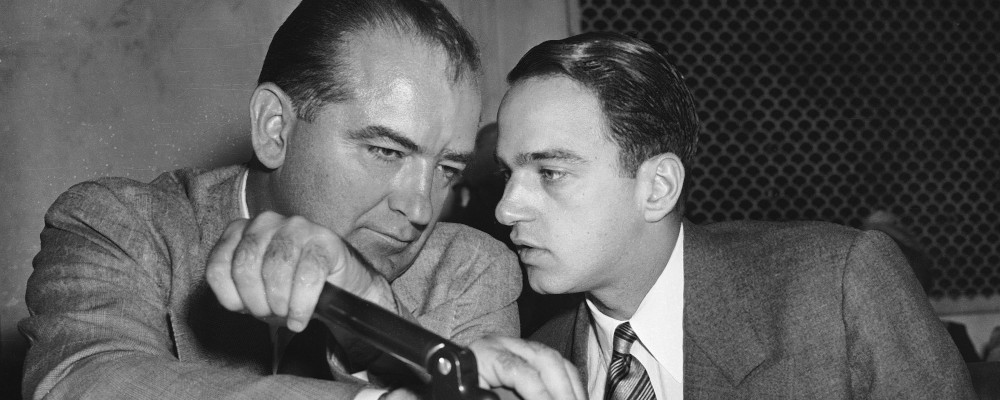
In any other season, this admission would not be considered a crime. In the 1930s, the brightest and best were appalled to see capitalism failing so completely, unemployment ravaging lives with no welfare nets to offer relief, fascists rising to power, and democracies bending over backward to appease them. Making their modest contributions, the Cambridge cell raised money for Ethiopia (invaded by Italy), canvassed for the Labour Party, demonstrated against British fascists, and supported hunger marchers demanding more. Norman was not a card-carrying member of the party but he does seem to have believed, like so many, that communism might offer solutions to the tangible collapse of the old world order.
He would later join a Marxist study group at Harvard. The RCMP did not consider these activities a “youthful flirtation” or even a “youthful indiscretion,” but once again could not uncover any proof of treason. Pearson continued to shield Norman, appointing him high commissioner to New Zealand in 1953, hoping the zealous hunt would fade.
In the summer of 1956, Pearson felt the political fervour had cooled enough to move Norman to Egypt as ambassador, just in time to deal with the Suez Crisis. Delighted to be back on the front lines, he provided thoughtful reports, impressed his diplomatic counterparts, and rallied with other allies to convince President Gamal Abdel Nasser to allow Canadian troops to join the U.N.’s first peacekeeping force, which Pearson had launched to resolve the conflict. Norman had been redeemed. And then in March 1957, the American senators resumed their hunt, in public, and this time they broke him.
On the morning of April 4th, convinced his ordeal would never end, Norman said goodbye to his wife and walked a short distance to an eight-story building he had visited many times containing the residence of the Swedish ambassador. He went up on the roof, walked to the east side facing the Nile, and climbed over a small wall to reach the edge. Thoughtful to the end, he paced, waiting to make sure that there was no one below. A window washer working on a building across the street saw him and screamed. He jumped to his death when he was sure he wouldn’t hurt anyone. When police reached the rooftop, they found his things neatly laid out, jacket, glasses, cuff links, watch, and, weighed down by a stone, two short notes, one to his wife, the other to the Swedish ambassador apologising for the using his building.
There was joyous confirmation in the hearts of the witch hunters and profound grief in Ottawa that turned to rage. One MP declared that Norman had been “murdered by slander just as surely as if someone had stuck a knife in his back.” For reasons not quite clear, Mrs. Norman buried her husband in Rome in the Protestant cemetery in the company of other tragic and romantic figures, John Keats and Percy Shelley.
During the 1980s, while writing what is still the most detailed and insightful biography on Norman, Professor Roger Bowen got a late-night phone call from a former director of operations at the CIA who said, “You will never learn the true story about Norman.” That taunt remains true, for now.
Recommended for You
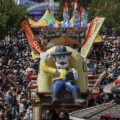
Falice Chin: The ‘wild and weird’ Calgary Stampede
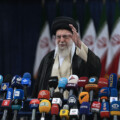
Michael Bonner: Are we witnessing the last gasp of Iran’s Islamic Republic?
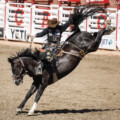
Need to Know: Yahoo, Alberta! You’re doing something right

Need to Know: Mark Carney’s digital services tax disaster
